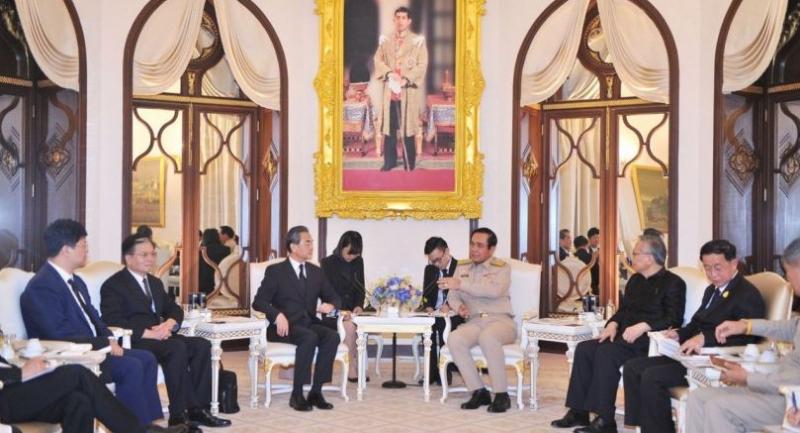HM the King invited to China for state visit

CHINA has officially invited His Majesty the King Maha Vajiralongkorn for a state visit, Chinese Foreign Minister Wang Yi said yesterday during his official visit to Thailand.
The formal invitation was made since HM the King newly took the throne, a diplomatic source said. The trip, if it occurs, would be the first time that a Thai King visits the People’s Republic of China.
The heads of state of the two countries last met in 2003, when China’s then-president Hu Jintao paid a courtesy call to the late King Bhumibol Adulyadej in Bangkok.

HM the King has not paid a state visit to any foreign country since assuming the throne in December.
Thailand and China have historic ties but only established official diplomatic relations in 1975, largely due to differing political ideologies.
Relations between the two countries have been noticeably closer since the ruling Thai junta staged the coup in 2014, an act that was widely criticised by Western countries, notably the United States during the previous administration of Barack Obama, for the suppression of democracy and violations of human rights.
Thai-Chinese deals on military hardware and infrastructure projects, many of which have been made at the government-to-government level, have been passed by Prime Minister General Prayut Chan-o-cha’s Cabinet.
On Sunday and yesterday, Wang visited the Kingdom for the first time in four years, meeting Prayut and Foreign Minister Don Pramudwinai separately.
After the meetings, Wang signed a book of condolences for the late King at the Grand Palace before heading to the Philippines last night.
The two countries’ ongoing Bt179.4-billion high-speed train project, for which Prayut has invoked his absolute Article 44 powers under the interim charter to facilitate, was also brought up during Wang and Don’s meeting.
Training concerns
During a joint press briefing, Wang said China would transfer technology and know-how as well as train Thai engineers during the project’s implementation.
Engineers have expressed concern that Article 44’s invocation allowing Chinese technicians to work on the project without having Thai licences would prevent Thai professionals from being involved with the long-term maintenance.
But Thai authorities have said China would be responsible for training and other costs.
Wang emphasised that the multi-billion baht project would proceed.
“It will be beneficial for Thai connectivity and long-term economic development,” he said. “Importantly, our intentions won’t be shifted and we expect it to flourish soon.”
Don reiterated that the multi-billion baht project would be beneficial for Thailand, given that it was in line with China’s One Belt and One Road initiative as well as Thailand’s Eastern Economic Corridor (EEC) and digital economy plans.
More connections would help to distribute economic opportunities to Thailand, Asean, China and potentially to European countries, Don said.
Talks also included ongoing efforts to push for a Code of Conduct framework regarding the contentious South China Sea, the Lancang-Mekong Cooperation and the draft of the Third Plan on Thailand-China Strategic Cooperation.
In regards to the last issue, the five-year plan would be effective from 2017 to 2020, during which Thailand would chair Asean, the Ayeyawady-Chao Phraya-Mekong Economic Cooperation Strategy and the Asia-Pacific Economic Cooperation, Don said.
During his talk with Prayut, Wang said Beijing would support Chinese private sector investment in the EEC, which was expected to produce transport and innovation hubs, Deputy Government Spokesperson Lt-General Werachon Sukondhapatipak told reporters.
Wang also said later that he had invited Prayut to attend a BRICS meeting in November, referring to the grouping of Brazil, Russia, India, China and South Africa.
Following the meeting, Prayut said China was a notable economic partner for Thailand in terms of trade, investment and tourism.
He added that China also understood Thai politics and had a trustworthy relationship with the Kingdom.
